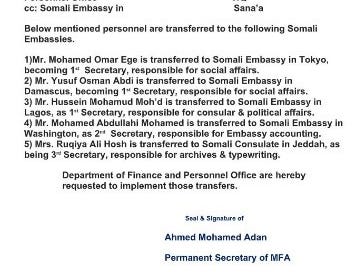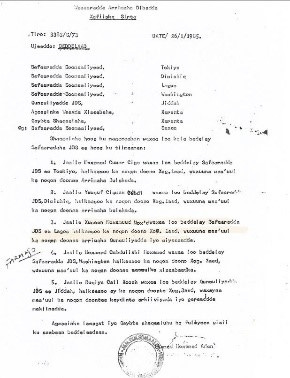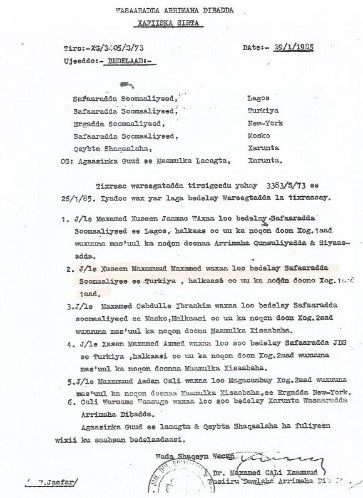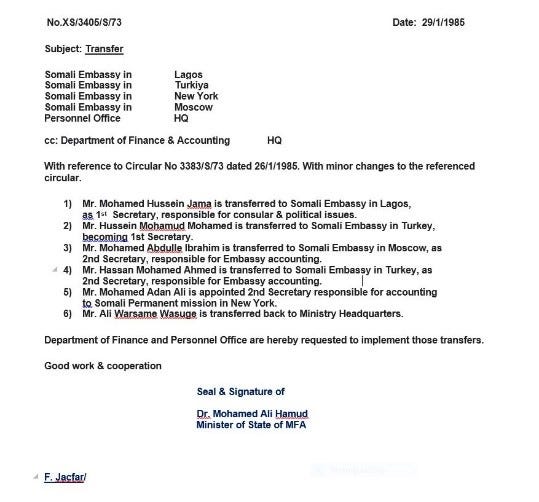Somalia's undiplomatic style of diplomacy
Which Embassies did you work in? Where did you study?

Once we used to have diplomatic warriors…. Part of the reflections of a former diplomat and a friend of mine who after many years decided to share with me some of the interesting experiences he encountered while working for the Somali Foreign Affairs Ministry (FAM) and during his diplomatic career.
This query was directed at me by the Permanent Secretary (PS) when I brought official notes to his office for his attention. He casually signed all of them without making any corrections. Taken aback by the query, I responded back in the negative, adding I hadn’t had the chance to work in an embassy before. But I had studied and graduated from the Somali National University – Faculty of Journalism. I informed the then PS Ambassador Ahmed M. Adan nicknamed “Qaybe” that I had been with the Protocol Department since I joined the Foreign Office in 1982. Taking advantage of the opportunity his query opened, I casually asked afterwards if I rightly deserved a transfer abroad since I had been working hard for three and half continuous years at this difficult Protocol Department and prove myself to be an efficient and responsible officer. Am I not entitled to a transfer? Is there no diplomatic service code or mechanism that guarantees personnel for a fair chance to transfer?
He shook his head, saying “I wish it was that way, but this is not the way things work here anymore”. Obviously, he was referring to how foreign ministry personnel had previously been transferred abroad, but that definitely - was not in his power. He then congratulated me on my command of written English and how I had excelled at writing neat and accurate notes. He added: “In contrast to you, there are personnel at the Ministry who have worked in Somali embassies abroad and yet cannot write accurate notes like you do, which I have been compelled to repeatedly correct on a daily basis”.
Although I didn’t say much when the PS made those comments, it gave me at least some confidence because my perception was that those personnel who worked at our Embassies abroad were well versed in foreign languages compared to us who never had the chance to go. But the other part of his words was clearly ringing in my mind; seek recommendation!
Every Monday, there was an early morning general guidance gathering for all personnel that used to be held in the conference room on the first floor. All of the staff including directors, deputies, section heads and attaches were required to be in the conference room right after signing the entry registry at 07:30 a.m. The only exceptions I recall were Hagi Hassan Mohamoud Ahmed, head of the main Archive due to the fact that he continuously received, in those days, a huge amount of incoming mail, and Isse Shire Ugas who was responsible for sending and receiving diplomatic pouches. I am talking about the period between 1982 to 1985.
There was also another weekly and separate meeting for the Directors of the Ministry to discuss current issues and other matters of importance. These meetings were usually chaired by the PS. Of course, there were occasions when the Minister or the Minister of State would participate those meetings themselves. So, I was so pleased to hear one day from the acting Chief of Protocol Ambassador Abdi Hagi Liban “ Dhaban-cad” that the PS had actually commended me praising my ability to write neat correct notes, mentioning my name at the meeting of the Directors, adding that I had raised the name and reputation of the department, which made him proud of me.
Just before that time a new officer by the name of Mohamed Hussein joined the ceremonial section which I was heading, working under my supervision for about six months. But unlike me, he had something that I didn’t - a recommendation, and the Minister Abdurahman J. Barre decided to transfer him to the Somali Embassy in Nigeria. It was also the Minister’s custom to sometimes order either the Minister of State or the PS to carry out any instructions of transfer he issues. So, with that in mind, he told the PS to make a transfer circular involving several personnel, including Mohamed Hussein who has been with me for just six months.
The PS, an expert manager who had worked with the British colonial administration before independence was a veteran diplomat with vast administrative experiences, who had previously been an ambassador for 24 consecutive years, serving in the four most important capitals of the world: Moscow twice, Washington DC, London and UN headquarters in New York. Realising the opportunity to right the wrong and seeing the similarities of our names; Hussein Mohamed & Mohamed Hussein – both working in the same ceremonial section, he made the brave decision of writing my name on the transfer circular which he subsequently signed in the evening. In those days circulars were written on a stencil duplicator or mimeograph, which were usually printed in the morning.
The Officer in charge of writing the circular by the brief name of Ahmed, just wrote my first two names on the dry stencil in the evening. Since he wanted to confirm my full name before printing, he waited and asked me in person early next morning when I was signing the entry registry for work at 07:30 a.m. Apparently Mr. Ahmed could have checked my file in the Personnel Office to get my full three names, but he wisely avoided as per the PS’s instructions, so as not to raise suspicion.
I was indeed grateful and very happy about my transfer to Nigeria when the circular became known to all. Hagi Hassan Mohamoud, head of the Archive office congratulated me when he brought the signed circular personally to me. The PS congratulated and advised me to get ready to leave immediately when I met him later that day which surprised me a bit. Because my protocol boss Abdi Hagi Liban on the other hand insisted that I should not rush to leave and stay at least two to three months minimum, in order to save and receive accumulated salaries of 2-3 months when I arrive at my new post. It was a good financial start for any newcomer, Abdi Hagi advised.
I was confused: to choose from two extremes, ignorant and unaware of what was really going on: to leave early or to wait some time. But I was for a big surprise. When the Minister finally found out what had happened, he asked me how long I had been working in the Ministry, and I told him. The head of the Personnel Office, Mr. Saddiq Mo’allim Mohamed, who was sitting beside the Minister confirmed. And the Minister who was meeting with a group of transferred personnel to provide customary awareness advice, of which I was one, said at last:” there is a slight mistake, you are not going to Lagos, but sit and relax – you are transferred too”.
I hope you can imagine how I felt when I got that disturbing news. Although I was technically given the green light and being assured by the Minister himself, yet my situation was quite uneasy and restless, after coming out from the meeting, as I vividly recall relating my dilemma to another colleague in the Department by the name of Adan M. Mohamud “ Kofi-Xariir”. I was like a starved man who sat at a restaurant & was brought a plate of food, but was asked to wait for another plate a little longer. So four days after the first circular was issued, another circular, in which I was transferred to Ankara instead of Lagos was signed by the Minister of State Dr. Mohamed A. Hamud.
And the following two circulars Nos: XS/3383/S/73 dated 26-01-1985 & XS/3405/S/73 dated 29-01-1985 which are written in Somali (but are translated to English) and shown below are testimony to what really happened in those fateful days.
The latter circular which instructs me to go to Ankara instead of Lagos, refers - to first one, so they were interconnected. Incidentally, the 4th person transferred in the first circular, happens to be the current Somali President Mohamed Abdullahi Mohamed “Farmaajo” who was appointed as 2nd Secretary responsible for the accounts of the Somali Embassy in Washington DC. Students of history may one day reflect on this; how corrupted the system was even in the early days of the military regime which clearly favored members of certain tribe. It is also useful to keep this is mind when assessing the current Somali president, Mr Farmjo who clearly is a product of that regime. Stay tuned for a forthcoming article on this issue.
Many years later, a diplomatic colleague who has had the opportunity to work in the past with Ambassador Ahmed M. Adan “Qaybe” at the United Nations headquarters in New York, would confess that the PS had indeed supported me on that occasion, helping me with the transfer episode in that prevailing situation. And although I was educated, competent and efficient officer who was entitled like others for the right of transfer, yet I would always be grateful for his kind favor towards me. After the collapse of the central government, I used to welcome and receive him in my office where I was posted as Counselor at the Somali Embassy in Abu Dhabi. He lived in the UAE for a while eventually returning back to North Somalia, where he spent living his last years.
Tribalism, corruption, mismanagement, theft of public funds has led to the collapse of the Somali nation. The situation was deteriorating every day until reaching at the point of no return in 1990. Unfortunately, the current situation is even worse than before, because I believe we are heading rapidly towards the same destruction course that was taken before. This is my personal perception and my intention is to warn the young generation to learn from the past lessons and avoid repeating our past mistakes.
As always comments, feedback welcome. Also please note we are not really interested in the elections taking place in Somalia at the moment, and we are covering historical facts for the record only and not influence anyone’s opinion of candidates running standing or sitting for an office in Villa Somalia.
Hussein M Mohamed and I went to Casa Popolare Primary School, Hodan, Mogadishu in the 1970s. And later on, admitted to the faculty of Journalism where he graduated and joined the Somali FAM. He continued to serve the country as a diplomat, but I left and continued my studies at Monash University in Australia. We are now working on a book about Somali Foreign Affairs, stay tuned.








Corruption was rampant in every sector of former regime. Imagine our current situation if we now consider these dark days as glorious days, this is how low we have fallen. I hope and pray that we do not fall to a new bottom. May Allah save Somalia.